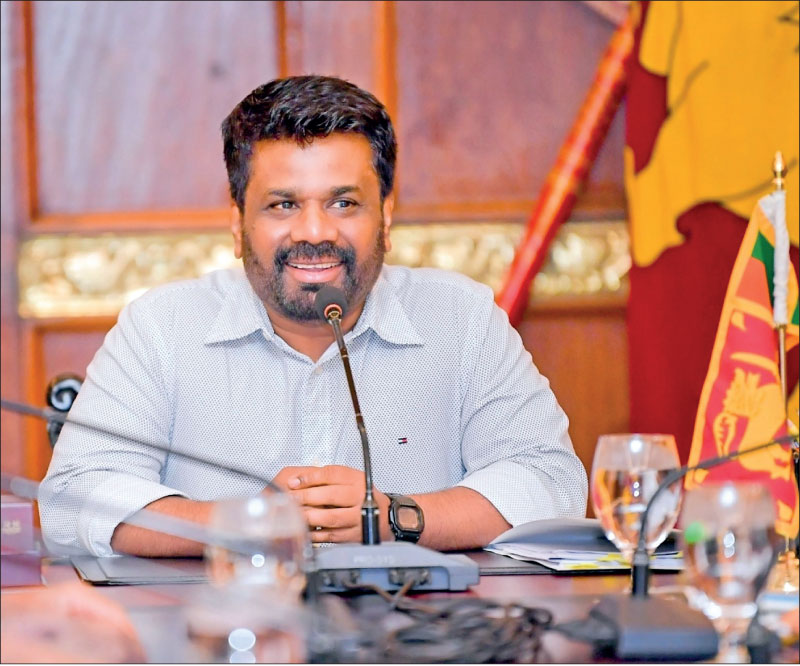Wednesday Feb 25, 2026
Wednesday Feb 25, 2026
Thursday, 28 November 2024 00:00 - - {{hitsCtrl.values.hits}}

The NPP’s rise from a 3% voter base in 2020 to a sweeping victory in 2024 exemplifies the power of walking the talk
|
 Sri Lanka’s National People’s Power (NPP) achieved an extraordinary political victory, uniting a nation through strategic leadership, authenticity, and adaptability. From a modest 3% voter base in 2020 to a sweeping win in 2024, the NPP exemplified how walking the walk – not just talking the talk – can transform a movement into a force for national unity. By examining their journey through the Corporate Compass of Leadership and Strategy, this article uncovers eight key principles within the corporate compass and additionally, critical success factors and the right people, enriched with insights from iconic corporate and leadership stories which fuels and navigates the compass towards success
Sri Lanka’s National People’s Power (NPP) achieved an extraordinary political victory, uniting a nation through strategic leadership, authenticity, and adaptability. From a modest 3% voter base in 2020 to a sweeping win in 2024, the NPP exemplified how walking the walk – not just talking the talk – can transform a movement into a force for national unity. By examining their journey through the Corporate Compass of Leadership and Strategy, this article uncovers eight key principles within the corporate compass and additionally, critical success factors and the right people, enriched with insights from iconic corporate and leadership stories which fuels and navigates the compass towards success
1. Re-strategising and rebranding: A new beginning
The NPP’s transformation was driven by strategic rebranding and leadership, akin to Apple’s revival under Steve Jobs.
2. Vision: North of the compass
Vision was the NPP’s guiding light, much like Lee Kuan Yew’s vision turned Singapore from a struggling city-state into a global economic powerhouse.
3. Integrity: A core value
Integrity was the bedrock of the NPP’s credibility, much like Warren Buffett’s ethos of transparency and ethical leadership at Berkshire Hathaway.
4. Resilience and focus: Weathering all challenges and manoeuvring through disruptions
The NPP’s resilience mirrors Donald Trump’s return to prominence after significant setbacks, demonstrating the power of persistence.
5. Adaptability: The foundation for growth
Adaptability enabled the NPP to evolve, akin to Netflix’s shift to streaming and Microsoft’s embrace of cloud computing under Satya Nadella.
6. Authenticity: The catalyst for unity
Authenticity bridged divides, much like Elon Musk’s transparent leadership resonates with Tesla’s loyal following.
7.Collaboration and inclusivity: Building bridges
Collaboration united diverse communities, much like Google fosters innovation through teamwork.
8. Transparency: Building trust
Transparency solidified credibility, much like Starbucks’ ethical sourcing practices.
The right people: Assembling a winning team
At the highest level of success, the foundation lies in assembling the right team – a group of individuals whose expertise, professionalism, and values align with the organisation’s vision and strategy. The right people are not merely executors but partners in innovation, progress, and trust-building.
Strategic relevance: The NPP’s triumph was made possible by its team of credible, professional leaders who inspired public trust. These individuals were not just competent but also embodied the values of integrity and collaboration, earning the confidence of a nation.
Corporate insight: Steve Jobs once said, “It doesn’t make sense to hire smart people and tell them what to do; we hire smart people so they can tell us what to do.” Apple’s resurgence under Jobs was as much about the team he built as the visionary products he introduced. Similarly, Elon Musk is known for assembling teams of highly talented individuals at Tesla and SpaceX, pushing them to achieve seemingly impossible goals. Musk’s leadership style, often characterised as demanding, creates an environment where extraordinary targets -such as launching reusable rockets or mass-producing electric vehicles- become achievable. His ability to inspire and challenge his team to innovate at the cutting edge exemplifies the power of the right people in achieving ambitious visions.
Historical example: Lee Kuan Yew’s leadership in Singapore reinforces this lesson. Surrounding himself with highly skilled technocrats, he ensured that Singapore’s policies were implemented with precision and efficiency, transforming the nation into a global economic powerhouse.
Key takeaway: Success requires more than just vision and strategy; it hinges on a team that embodies credibility, capability, and collaboration—one that complements leadership and drives execution to perfection.
Diagram reference: The Corporate Compass integrates collaboration, inclusivity, and integrity, reflecting the essential role of the right people in achieving sustained success.
At a high level, the right people are those who:
Share the organisation’s vision and values.
Bring diverse skills and innovative thinking to the table.
Work collaboratively while challenging the status quo to drive better outcomes.
Commit to the organisation’s long-term mission, ensuring trust and reliability across all levels.
Whether in politics, corporate leadership, or nation-building, having the right people at the helm ensures that strategies are not just planned but executed with excellence, resilience, and integrity. Elon Musk’s relentless push for innovation and the NPP’s reliance on trusted professionals demonstrate that the right team can achieve extraordinary outcomes, even against immense odds.
Critical success factors: Sustaining the journey
Peter Drucker’s insight, “Culture eats strategy for breakfast,” highlights the importance of cultural alignment.
The Corporate Compass integrates principles like Integrity, Inclusivity, and Transparency to support a robust administration culture.
Conclusion: Walking the talk to transform a nation
The NPP’s rise from a 3% voter base in 2020 to a sweeping victory in 2024 exemplifies the power of walking the talk. By consistently delivering on promises, they built trust, overcoming 76 years of disillusionment with traditional politics.
The Corporate Compass of Leadership and Strategy – integrating Vision, Integrity, Resilience, Adaptability, Authenticity, Collaboration, Inclusivity, Transparency, and Focus – offers a blueprint for leaders worldwide. From Steve Jobs to Lee Kuan Yew, history proves that principled leadership transforms nations and organisations alike.
Real success, as the NPP demonstrated, comes not from talking the talk but from walking the talk.
(The writer is a leadership and strategic management enthusiast and a doctoral candidate at the University of Colombo, Faculty of Management and Finance.)